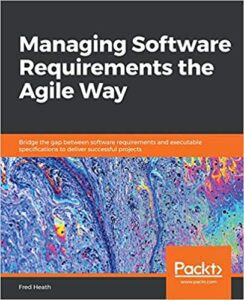Fred Heath is the author of Managing Software Requirements the Agile Way, we got the chance to sit down with him and find out more about his experience of writing with Packt.
Q: How did you become an author for Packt? Tell us about your journey.
Fred: I had been thinking about presenting my knowledge on managing requirements and delivering successful software systems, in the form of a book, for the last year or so. In December 2019 I wrote a book proposal with the outline of the book I wanted to write and a summary of its content. At that time I had already created a video course for Packt (Expert Rails 5), so when I decided I wanted to publish a book, Packt was an obvious choice. I sent in my book proposal, we had a chat with Packt about it and they accepted it, which was very exciting for me. I remember it was just after the new year, so the book deal felt like a late Christmas present!
Q: How long did it take you to write the book?
Fred: I started writing in early January and finished in early July, so approximately 7 months, not counting the time for editing after technical and final reviews. Having said that, I had already written down plenty of notes, thoughts and small essays on the subject over previous years, during my daily work in Software Engineering. Many of these writings were included in the book’s chapters, some of them as chapter sections in their own right. If I didn’t have this material, it would probably have taken me longer than 7 months to write the whole book.
Q: What kind of research did you do, and how long did you spend researching before beginning the book?
Fred: The techniques, methods, and processes described in this book had already been fermenting in my mind over the last 5 or 6 years before I decided to write a book about them. I also had a lot of practical experience with managing requirements and delivering systems and I had a good idea of what worked and what didn’t. When I started writing, what I had to do is collate all the sources and knowledge that I had picked up over the previous years. For example, over my career I had read many studies which showed that primary cause of software project failure was requirements mismanagement. Before I started writing, I had to look-up all these sources, and many more, again, to ensure that my perception remained relevant. I also did a lot of catching up on the latest agile trends for managing requirements, wanting to make sure my techniques were not superseded, they weren’t!
Q: Did you face any challenges during the writing process? How did you overcome them?
Fred: The biggest challenge any writer faces IMO is time-management. I had agreed to a release schedule with Packt, and at the same time I had a full-time job which I had to do to the best of my ability. The challenge was how to strike a balance between the book writing and my work commitments. There were times when I had to focus all my energy on work-related stuff and so I had to neglect my book-writing for a bit, which I then had to make-up for by writing more over the weekends. I think writing technical books is more challenging than writing fiction, as you are constrained by the technologies and practical implications of what you’re writing about, so you can’t use imaginative plots or poetic license in your book, you have to keep your prose detailed, concise and real. Luckily, both the Pack editorial team and my work colleagues were very understanding and supportive, so I had a lot of leeway in juggling my daily work and my book-writing.
Q: What advice would you give to readers learning tech? Do you have any top tips?
Fred: Oh yes, indeed. My first tip would be that technology on its own is never the answer. Technology needs to be used by people and blend in with their daily workflow. Successful technologists are able to manage expectations, not just their own, but also their teams and their clients, as well as apply technological skills. My second tip is an old classic—there is no silver bullet. Many technologies are hyped as the ‘next big thing’ that will solve specific problems and make everyone’s life easier. First off, this rarely happens. Secondly, even if it does happen, every technology that has solved an existing problem has created many new ones. You only have to look at cloud computing; although it has solved scalability and availability issues, it has created administrative and security ones. So my tip is, don’t put all your eggs in one basket. Complex problems are not solved by singular technologies. Invest your time and knowledge in a multitude of areas, even if they may not be currently trending
Q. How do you keep up-to-date on your tech?
Fred: I read a lot. Packt books help with that. I also read many tech blogs and online articles. I have a technology RSS feed which I check daily, yes RSS, I’m old-fashioned like that and I can see at a glance news, articles and posts as they come out. If something catches my eye I’ll read it and then I may read other related links. I also attend meet-ups and conferences, most of them are online now so I don’t even have to travel, and I keep up with relevant tech communities that way too.
Q. Do you have a blog that readers can follow?
Fred: My personal blog is http://bootstrap.me.uk/, though I haven’t updated it in a long time. These days I mostly post here: https://dev.to/redfred7 as it’s easier and has a wider audience.
Q. Can you share any blogs, websites and forums to help readers gain a holistic view of the tech they are learning?
Fred: Too many to mention here, but off the top of my head:
- https://johnfergusonsmart.com/blog/
- https://www.mountaingoatsoftware.com/blog
- https://gojko.net/posts.html
- https://dannorth.net/introducing-bdd/
- https://cucumber.io/
- https://medium.com/@mattwynne
Q. How would you describe your author journey with Packt? Would you recommend Packt to aspiring authors?
Fred: I had already worked with Packt to create a video course a few years ago, so I kind of knew what to expect, which was a friendly and open-minded editorial and publishing team. Everyone in Packt treated me with respect and they listened to what I had to say. For that reason, I think Packt is a great choice if you’re an aspiring author, as it provides an environment where you and your ideas are taken seriously, and where you can thrive and expand.
You can find Fred’s book on Amazon by following this link: Please click here









